新概念英语第二册第课—第课测试卷与答案
新概念英语第二册第二课(包含课文、练习及答案)
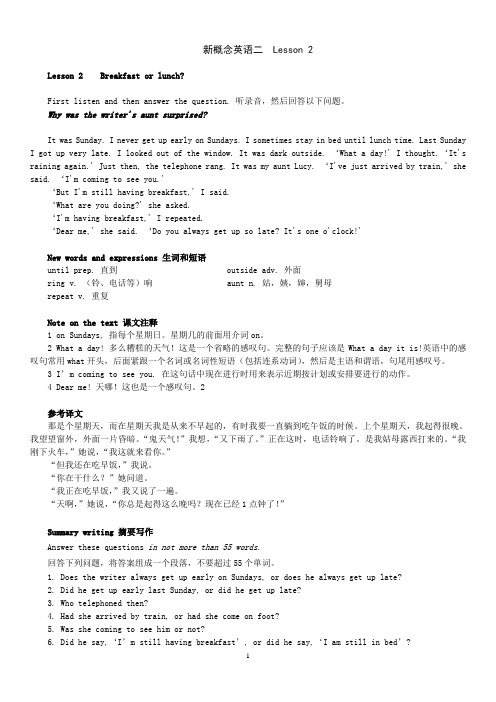
新概念英语二 Lesson 2Lesson 2 Breakfast or lunch?First listen and then answer the question. 听录音,然后回答以下问题。
Why was the writer's aunt surprised?It was Sunday. I never get up early on Sundays. I sometimes stay in bed until lunch time. Last Sunday I got up very late. I looked out of the window. It was dark outside. ‘What a day!' I thought.‘It's raining again.' Just then, the telephone rang. It was my aunt Lucy. ‘I've just arrived by train,' she said. ‘I'm coming to see you.'‘But I'm still having breakfast,' I said.‘What are you doing?' she asked.‘I'm having breakfast,' I repeated.‘Dear me,' she said. ‘Do you always get up so late? It's one o'clock!'New words and expressions 生词和短语until prep. 直到 outside adv. 外面ring v. (铃、电话等)响 aunt n. 姑,姨,婶,舅母repeat v. 重复Note on the text 课文注释1 on Sundays, 指每个星期日。
新概念英语第二册课测试题答案版
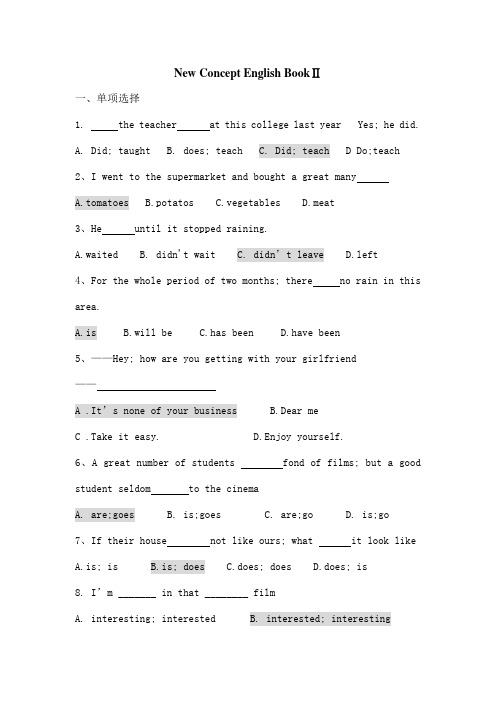
New Concept English BookⅡ一、单项选择1. the teacher at this college last year Yes; he did.A. Did; taughtB. does; teachC. Did; teach D Do;teach2、I went to the supermarket and bought a great manyA.tomatoesB.potatosC.vegetablesD.meat3、He until it stopped raining.A.waitedB. didn't waitC. didn’t leaveD.left4、For the whole period of two months; there no rain in this area.A.isB.will beC.has beenD.have been5、——Hey; how are you getting with your girlfriend——A .It’s none of your business B.Dear meC .Take it easy. D.Enjoy yourself.6、A great number of students fond of films; but a good student seldom to the cinemaA. are;goesB. is;goesC. are;goD. is;go7、If their house not like ours; what it look likeA.is; isB.is; doesC.does; doesD.does; is8. I’m _______ in that ________ filmA. interesting; interestedB. interested; interestingC. interested; interestedD. interesting; interesting9. ------ Hurry up We have little time------ I ____________.A. will comeB. comeC. shall comeD. am coming10. -------_____________-------I am Italian.A.What’s your jobB. What’s your nameC. What nationality are youD.Where do you from11. I don’t have ______writing paper; I only have _____chalk s.A. any; anyB. any; someC. some; someD.some;any12. Look; the little dog ______after a big catA. runsB. is runningC. is going to runD.isruning13. It’s very cold. _______ your coat.A. Take offB. Put onC. Turn onD.Put off14.The man could not bear it.He could not it.A.carryB.sufferC.standD.lift15.Just then;the telephone rang.It rang .A.at onceB.immediatelyC.againD.at thatmoment16.On the last day he made a big dicision.It was the dayof his holiday.A.finalB.endtestD.bottom17.He calls at every house in the street.He everyone.A.shouts atB.callsC.cries out atD.visits18.The detectives were a valuable parcel of diamonds.A.expectingB.waitingC.expecting forD.expecting to19.The man is fond of gardens. .A.They like himB.They like to himC.He likes themD.Helikes they20.How many times did the clock .A.hitB.beatC.knockD.strike二、Change the sentences with what or what an21. It was very hot yesterday.What a hot day it was yesterday22. It is so coldWhat cold weather it is23. You have such an old bike.What an old bike you have24. The book Tom is reading is very interesting.What an interesting book Tom is reading25. We live in a very noisy place.What a noisy place we live in三、用 over; between; along; in front of; behind; 或 across 等介词或介词短语填空26. A lot of birds are flying ___over____ the river.27. The teacher is standing _____in front of_______ the blackboard.28. I am running __along_____ the Great Wall长城.29. They are swimming __across____ the river.30. I am sitting ____between_____my brother and my sister.四、用所给单词的适当形式填空:31、He is not very friendly friend towards newcomers新来的.32、She slammed the telephone down angrily angry.33、It was a sudden decision decide34、She works for that restaurant as a waitress waiter35、She is very excited exciting about winning the first prize.36、What have you been done lately late.37、We are very pleased please with our new house.38、She rarely rare visited her aunt.39、“What do you want”She asked rudely rude40、I had a long conversation converse with her the other day不久前一天.五、词组互译41、none of your business 与你无关42、破坏我的假日 spoil my holiday43、在回家的路上 on the way back home44、by the way 顺便说一下45、今天就到此为止 let’s call it today六、阅读理解How many different languages are spoken in the world today There are about 5;000 different languages. Nearly 900 languages are spoken in India.Chinese is the language spoken by the biggest number of people in the world.But the most widely spoken language in the world is English.300;000;000 people speak English as a first language.Nearly twice as many--about 650 million people speak it as a foreign language.How many words are there in the English language There are about 490;000.Also;there are about 300;000 words used in science 科技.There are more words in English than in any other language.But most people use no more than 60;000 words.Children;leaving school at the age of 1 6;know about 1 5;000 words.1.The Chinese language is spoken ________.A.in most countries in the worldB.in 600 countriesC.by the biggest number of people in the world2.About 650 million people speak English as________.A.a first languageB.well as the native speakersC.a second language3.Only ________ English words are used by most people.A.six thousandB.three hundred thousandC.sixty thousand4.Children ________ know about 15;000 words.A.who start school at the age of 6B.who study at schoolC.who finish school at sixteen5.Which of the following is true’A.There are no more than 5;000 different languages in the world.B.English is the most widely-used language.C.The Indian people speak 800 languages.One day a poor student was walking through a town. He had not had anything to eat for several days and he was very hungry. And when he saw a man selling homemade hamburgers; he let out a scream and fell to the ground. When the surprised seller asked the student what the matter was; the student answered; “I don’t like hamburgers. In fact; I hate them. Whenever I see them; I feel ill and can’t eat.”The hamburger seller then thought that he would play a joke onthe student. He put ten hamburgers in the comer of a room and then locked the student in it. After a short time; the hamburger seller opened the door of the room. He was surprised to find that the studenthad eaten all the hamburgers. The student explained. “For some strange reason; I suddenly decided that I liked hamburgers.”The hamburger seller was angry that the student had fooled him.He asked what other things he did not like to eat. “Oh; I like everything; ”answered the student; “Except at the moment I wouldhate to drink two cups of good strong tea”6. The student was very hungry because .A.he was illB.he had not eaten for a long timeC.he saw the hamburgers7. The hamburger seller wanted to the student.A.help B;pull up C.play a joke on8. The hamburger seller was surprised to find the student had eaten hamburgers.A.tenB.fiveC.two9. In fact; .A.the seller wanted to sell some hamburgers to the studentB.the student really hated hamburgersC.the student fooled the hamburger seller10. The student .A.wanted some teaB.didn’t like teaC.hated strong teaGeorge works in a factory. He was born in a very poor family and was in school for only four years. He has to do the hard work; but he is paid less because of this. He likes to watch football matches very much and spends much time on it.One evening there was a big football match on a playground. He borrowed some money from his friend and hurried there. There were a lot of people there. And all the tickets were sold out. He was sorry for it. He saw a pole电线杆outside the playground and climbed it up quickly. A policeman came and said. “It’s dangerous to stay on it Come down”“Wait a minute; please” George said and just at that moment the policeman heard cheers in the playground and asked in a hurry. “Which team has kicked a goal ” “Ours” “WonderfulYou can stay there. But take care” the policeman said happily and left. When the match would soon be over; he came back again and asked;“Who’s won ” “Theirs; 3-2.” “Come down; ”the policeman said a ngrily; “Such a match isn’t worth watching”George had to come down. But soon they heard cheers again. Thepoliceman said in a hurry; “Climb up quickly and see who’s kickeda goal”11. George is paid less because he didn’t learn much when he was young.A.RightB.WrongC.Doesn’t say12. George climbed up the pole because he hoped to save some money.A.RightB.WrongC.Doesn’t say13. The policeman soon changed his mind at the first time because he thought it was safe for George to be on the pole.A.RightB.WrongC.Doesn’t say14. The policeman became angry when he heard their team had lost the game.A.RightB.WrongC.Doesn’t say15. Both George and the policeman are football fans.A.RightB.WrongC.Doesn’t say七、完型填空Mrs. Williams loved flowers and had a small __1__ beautiful garden.In the summer;her roses were always the __2__ in her street.0ne summer afternoon her __3__ rang;and when she went to the front door;she saw a small boy outside.He was about seven years old.and was holding a big bunch束of beautiful roses in his hand.“I __4__ roses; ” he said.“Do you want any They are quitecheap.One shilling __5__ a big bunch.They are fresh新鲜.I __6__ them this afternoon.” ’“My boy;” Mrs. Williams answered;“I pick __7__ whenever I want;and don’t pay __8__ for them;because I have lots in my garden.”“Oh;no;you haven’t;”said the small boy.“There __9__ any roses in your garden ----__10__ they are here in my hand”1.A and B or C but2.A better B worst C best3.A bell B telephone C door4.A sell B sold C am selling5.A for B by C in6.A brought B took C picked7.A flowers B roses C a flower8.A nothing B something C anything9.A haven't B won’t C aren’t10.A so B and C because。
新概念英语第二册第课—第课测试卷与答案

新概念英语第二册第25-34课测试卷一、单词与短语互译(30分)1.not only…but…as well2.neither…nor..3.外国人4.鉴赏5.材料6.上下颠倒地7.put up one’s tent 8.wind one’s way across…9.舒适的,安逸的10.爬到…里面11.believe in ancient myths12.没有效果13.从某地飞往某地14.废弃(v)15.偏僻的,人迹罕至的16.row on the river17. be out of sight 18.对某人大声喊19.a book of his own 20.他早年的艰难岁月21.一个穿着讲究的女人22.最昂贵的物品之一23.出发,动身24.struggle up the cliffs 25.向岸边游去26.在前面(adv.)27.不知不觉地发现某人处在…28.拜访某地29.not any more 30.一个十五岁的男孩二、用所给动词的正确形式填空(20分)1.The sun (rise) in the east and (set) in the west .2.”You (joke),”I replied. “I (not know) anyone who does .”3. She (pay) the bill and (leave) the shop.4.”Up till now I (be) to New York three times .” he (add)5.She never expected her bicycle (find). The thief (question).6.On (arrive) at the shore, the girl struggled up the cliff towards the light she (see).7.He (worry) all week. Last Saturday he (receive) a letter from the local police .8.”You (always be) late , Tom .” his teacher (say). “You (be)late five times this week. You (be) nearly late every class . Don’t (be) late next time. Or I’ll punish you. Then I (call) up your mother.”三、句子翻译(15分)1.她的英文讲得不但非常认真,而且吐字也非常清楚。
(完整版)新概念英语第二册第二课(包含课文、练习和答案)
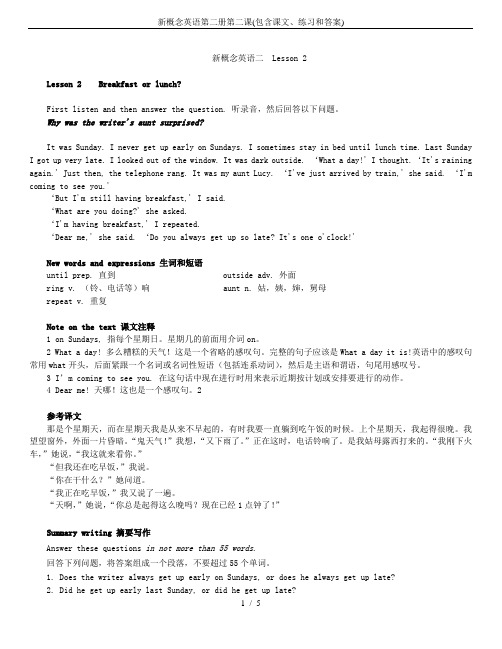
新概念英语二 Lesson 2Lesson 2 Breakfast or lunch?First listen and then answer the question. 听录音,然后回答以下问题。
Why was the writer's aunt surprised?It was Sunday. I never get up early on Sundays. I sometimes stay in bed until lunch time. Last Sunday I got up very late. I looked out of the window. It was dark outside. ‘What a day!' I thought.‘It's raining again.' Just then, the telephone rang. It was my aunt Lucy. ‘I've just arrived by train,' she said. ‘I'm coming to see you.'‘But I'm still having breakfast,' I said.‘What are you doing?' she asked.‘I'm having breakfast,' I repeated.‘Dear me,' she said. ‘Do you always get up so late? It's one o'clock!'New words and expressions 生词和短语until prep. 直到 outside adv. 外面ring v. (铃、电话等)响 aunt n. 姑,姨,婶,舅母repeat v. 重复Note on the text 课文注释1 on Sundays, 指每个星期日。
新概念英语第二册课后练习题答案详解(第2课)
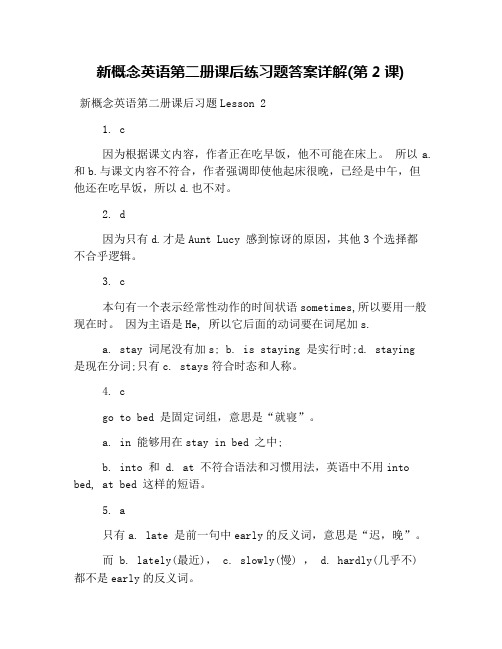
新概念英语第二册课后练习题答案详解(第2课)新概念英语第二册课后习题Lesson 21. c因为根据课文内容,作者正在吃早饭,他不可能在床上。
所以a. 和b.与课文内容不符合,作者强调即使他起床很晚,已经是中午,但他还在吃早饭,所以d.也不对。
2. d因为只有d.才是Aunt Lucy 感到惊讶的原因,其他3个选择都不合乎逻辑。
3. c本句有一个表示经常性动作的时间状语sometimes,所以要用一般现在时。
因为主语是He, 所以它后面的动词要在词尾加s.a. stay 词尾没有加s;b. is staying 是实行时;d. staying是现在分词;只有c. stays符合时态和人称。
4. cgo to bed 是固定词组,意思是“就寝”。
a. in 能够用在stay in bed 之中;b. into 和 d. at 不符合语法和习惯用法,英语中不用into bed, at bed 这样的短语。
5. a只有a. late 是前一句中early的反义词,意思是“迟,晚”。
而 b. lately(最近), c. slowly(慢) , d. hardly(几乎不)都不是early的反义词。
6. b此问句的回答是By train ,是表示方式的,意思是乘火车来的。
只有b. How才能对句子中表示方式的部分实行提问。
而a. When是就时间提问的; c. Why是就原因提问的;d. where 是就地点提问的。
7. b如果填a. still句子不符合语法规则,也不符合逻辑; 选c. often 和 d. always 也不符合逻辑。
只有填b. now 句子才符合逻辑:他现在不能见他姑妈,因为他正在吃早饭。
8. a4个选择都有看的意思。
Look 的词意思是“看,望”强调看的动作,常和介词at, outof 等连用;See 的词意思是“看到,见到”强调结构,后面要带宾语;Watch的词意思是“观看,注视”多用来指看戏剧,电视节目等,是及物动词,如watch TV, watch a play;Remark 的词意思是“注意到,觉察到”也强调结果。
最新新概念英语第二册-1-5课测试题
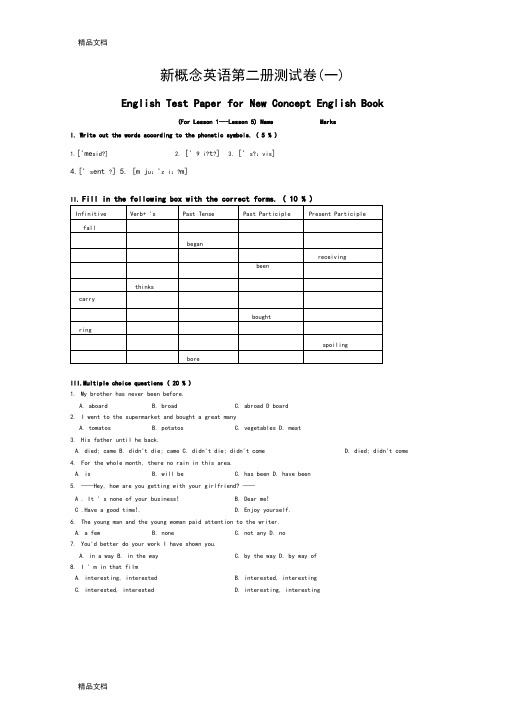
新概念英语第二册测试卷(一)English Test Paper for New Concept English Book(For Lesson 1---Lesson 5) Name MarksI. Write out the words according to the phonetic symbols. ( 5 % )1.['me sid?]2. [' 9 i?t?]3. [' s?:vis]4.[' s ent ?]5. [m j u:'z i:?m]II.Fill in the following box with the correct forms. ( 10 % )III.M ultiple choice questions ( 20 % )1.My brother has never been before.A. aboardB. broadC. abroad D board2.I went to the supermarket and bought a great manyA. tomatosB. potatosC. vegetablesD. meat3.His father until he back.A. died; cameB. didn't die; cameC. didn't die; didn't comeD. died; didn't come4.For the whole month, there no rain in this area.A. isB. will beC. has beenD. have been5.——Hey, how are you getting with your girlfriend? ——A . It ' s none of your business! B. Dear me!C .Have a good time!. D. Enjoy yourself.6.The young man and the young woman paid attention to the writer.A. a fewB. noneC. not anyD. no7.You'd better do your work I have shown you.A. in a wayB. in the wayC. by the wayD. by way of8.I ' m in that filmA. interesting, interestedB. interested, interestingC. interested, interestedD. interesting, interesting9. Hurry up! We have little time! ------------------- I. A. will comeB. comeC. shall comeD. am coming10. My mother has Hang Kong twice. A. got toB. come toC. been inD. been to11. I have visited different places in Australia. A. a great number ofB. a great many ofC. a great numberD. many a12. They killed the men but the children and women.A. sparedB. hurtC. sentD. fell13. He wants to be a doctor or go into.A. businessB. cinemaC. conversationD. play14. How can you bear in this place? A. livingB. to liveC. lived15. Just then, the telephone rang. It rang . A. at onceB. immediatelyC. again16. He told me that he to Paris before. A. has gone B. had goneC. has beenD. had been17. There was not in the street at 11:00 last night.A. a single personB. a single peopleC. any peopleD. only a few people 18. Helen never write to her brother Tony. She rings him. A. sometime B. sometimesC. some timesD. some time19The boy's parents him too much---they give him everything he asks for.A. brokeB. breakC. spoilD. spoiled20. He my pen yesterday, but it to me yet. A. borrowed; gave B. lent; hasn't givenC. lent; givesD. borrowed; hasn't givenIV. Put in the correct form of the verbs in brackets. (10 % ) Dear Sir,I( apply ) for a telephone over a year ago. I( fill ) in a form and (pay )a deposit. You( promise ) to install a phone at once, but I still (wait ).Up till now, I( write ) to you eight times and I( visit ) your offices three times. You always( reply ) that I can expect a phone soon.There's no need to write. Just(give ) me a ring. I( wait )long enough.V. Write these sentences again. Each sentence must begin with what. ( 10% ) 1. It was very hot yesterday. hot day it was yesterday! 2. It is so cold. ______ cold weather it is! 3. You have such an old bike. old bike you have!4. The book Tom is reading is very interesting. interesting book Tom is reading!5. We live in a very noisy place.D. arrivingD. at that moment___________________________ n oisy place we live in!VI. Fill in the blanks using the proper prepositions. (5% ) 1. He' worked for this big firm the year 2010. 2. The week before last I went to my hometown train. 3. The shop assistant found some curtain material me.4. I met my English teacher the way home the day before yesterday.5.Tim is in Australia now. His brother hasn 't seen him last year.VII. Give the correct form of the words in parentheses. ( 10 % ) 1. He is not very(friend) towards the newcomer( 新来的). 2. The writer looked at the man and the woman (angry). 3. In the end, the writer made a big(decide). 4. She works for that restaurant as a(waiter)5. She is very(exciting) about winning the first prize.6. What have you done(late)?7. The meeting place was within easy walking. (distant).8. Tim has already visited many places in Australia. ( difference ) 9. “ What do you want " She asked (rude)10. I had a long (converse) with her the other day (不久前一天)VIII. Point out the members of the following sentences . ( 10% )(S---主语;V---谓语(动词);P---表语;O---宾语;Oi---间接宾语;Od---直接宾语;Co---宾语补足语;A---状语; App.---同位语)1.He has been in Australia for six months. ()()()()2. L never get up early on Sundays.()( )( ) ( )3. On the last day he spent the whole day ( ) ()( )4. His uncle left him some money. () ()() ( )5.The writer's brother, Tim, is finding ( ) ()IX. Reading Comprehension.Passage OneHow many different languages are spoken in the world today? There are about 5,000 different languages. Nearly 900 languages are spoken in India .Chinese is the language spoken by the biggest number of people in the world . But the most widely spoken language in the world is English . 300,000,000 people speak English as a first language. Nearly twice as many--about 650in his room . ()this trip very interesting. ()()(20% )million people speak it as a foreign language .How many words are there in the English language? There are about 490,000 . Also , there are about 300,000 words used in science(科技).There are more words in English than in any other language. But most people use no more than 60,000 words .Children , leaving school at the age of 16 , know about 1 5,000 words .1.The Chinese language is spoken.A.in most countries in the worldB.in 600 countriesC.by the biggest number of people in the worldD.only in China2.About 650 million people speak English as .A. a first languageB. well as the native speakersC. a second languageD. fluently as Americans3.Only English words are used by most people .A. six thousandB. three hundred thousandC. sixty thousandD. sixty hundred4.Children know about 15,000 words .A. who start school at the age of 6B. who study at schoolC. who finish school at sixteenD. Who learn English at school5.Which of the following is true?A.There are no more than 5,000 different languages in the world .B.English is the most widely-used language .C.The Indian people speak 800 languages .D.The Chinese learn English only when they are at school.Passage TwoOne day a poor student was walking through a town. He had not had anything to eat for several days and he was very hungry. And when he saw a man selling homemade hamburgers, he let out a scream and fell to the ground. When the surprised seller asked the student what the matter was, the student answered, "I don ' t ere.hambctrg hate them. Whenever I see them, Ifeel ill and can ' t eat. ”The hamburger seller then thought that he would play a joke on the student. He put ten hamburgers in the corner of a room and then locked the student in it. After a short time, the hamburger seller opened the door of the room. He was surprised to find that the student had eaten all the hamburgers. The student explained. " Fosome strange reason, I suddenly decided that I liked hamburgers.The hamburger seller was angry that the student had fooled him. He asked what other things he did not like to e at. "Oh,I like everything,“ answered the student, “ Exceptat the moment I would hate to drink two cups of good strong tea! ”6.The student was very hungry because.A. he was illB. he had not eaten for a long timeC. he saw the hamburgersD. he worked too hard at school7.The hamburger seller wanted to the student.A. helpB. sell a few hamburgers toC. play a joke onD. taught a lesson to8.The hamburger seller was surprised to find the student had eaten hamburgers.A. tenB. fiveC. twoD. twenty9.In fact, .A.the seller wanted to sell some hamburgers to the studentB.the student really hated hamburgersC.the student fooled the hamburger sellerD.the student felt cold and wanted to stay in the room10.The student .A. wanted some teaB. didn ' t like teaC. hated strong teaD. would not like any teaX.Cloze. (10 % )Mrs. Williams loved flowers and had a small __1__ beautiful garden . In the summer, her roses were always the __2__ in her street. 0ne summer afternoon somebody was ringing at the __3__ , and when she went to the front door, she saw a small boy outside. He was about seven years old. and was holding a big bunch(束)of beautiful roses in his hand ."I __4__ roses, " . he Dod/ou want any? They are quite cheap One shilling __5__ a bigbunch. They are fresh(新鲜).I __6__ them this afternoon .“'“My boy " Mrs. Williams answered, “I picksome __7__ whenever I want , and don ' t pay __8__ for them , because I have lots in my garden .”O Ohno, you haven :" t said the small boy “ There __9__ any roses in your garden----__10__ they are here in my hand! ”1. A and B or C but D so2. A better B worst C best D worse3. A bell B telephone C door D phone4. A sell B sold C am selling D selling5. A for B by C in D at6. A brought B took C picked D received7. A flowers B roses C a flower D a rose8. A nothing B something C anything D everything9. A haven't B won' t C aren ' t D are going to10. A so B and C because D butXI.Write a short letter in no more than 60 words. ( 10% )情景:你刚收到你的朋友Jack从美国的来信,用所给的词写封回信。
新概念英语第二册第二课(包含课文、练习及答案)
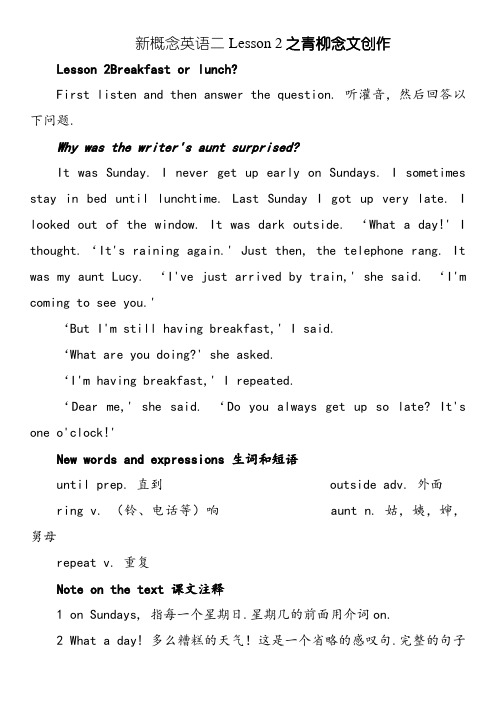
新概念英语二Lesson 2之青柳念文创作Lesson 2Breakfast or lunch?First listen and then answer the question. 听灌音,然后回答以下问题.Why was the writer's aunt surprised?It was Sunday. I never get up early on Sundays. I sometimes stay in bed until lunchtime. Last Sunday I got up very late. I looked out of the window. It was dark outside. ‘What a day!' I thought.‘It's raining again.' Just then, the telephone rang. It was my aunt Lucy. ‘I've just arrived by train,' she said. ‘I'm coming to see you.'‘But I'm still having breakfast,' I said.‘What are you doing?' she asked.‘I'm having breakfast,' I repeated.‘Dear me,' she said. ‘Do you always get up so late? It's one o'clock!'New words and expressions 生词和短语until prep. 直到 outside adv. 外面ring v. (铃、电话等)响 aunt n. 姑,姨,婶,舅母repeat v. 重复Note on the text 课文注释1 on Sundays, 指每一个星期日.星期几的前面用介词on.2 What a day! 多么糟糕的天气!这是一个省略的感叹句.完整的句子应该是What a day it is!英语中的感叹句常常使用what开首,后面紧跟一个名词或名词性短语(包含连络动词),然后是主语和谓语,句尾用感叹号.3 I’m coming to see you. 在这句话中现在停止时用来暗示近期按计划或安插要停止的动作.4 Dear me! 天哪!这也是一个感叹句.2参考译文那是个星期天,而在星期天我是从来不早起的,有时我要一直躺到吃午饭的时候.上个星期天,我起得很晚.我望望窗外,外面一片昏暗.“鬼天气!”我想,“又下雨了.”正在这时,电话铃响了.是我姑母露西打来的.“我刚下火车,”她说,“我这就来看你.”“但我还在吃早饭,”我说.“你在干什么?”她问道.“我正在吃早饭,”我又说了一遍.“天啊,”她说,“你总是起得这么晚吗?现在已经1点钟了!”Summary writing 摘要写作Answer these questions in not more than 55 words.回答下列问题,将答案组成一个段落,不要超出55个单词.1. Does the writer always get up early on Sundays, or does he always get up late?2. Did he get up early last Sunday, or did he get up late?3. Who telephoned then?4. Had she arrived by train, or had she come on foot?5. Was she coming to see him or not?6. Did he say,‘I’m still having breakfast’, or did he say,‘I am still in bed’?7. Was his aunt very surprised or not ?8. What was the time?_____________________________________________________________ _____________________________________________________________ _____________________________________________________________ _____________________________________________________________ _____________________________________________________________ _____________________________________________________________ _____________________________________________________________ _____________________________________________________________ _____________________________________________________________ _______________Key Structures关键句型Now,Often and Always 暗示现在和常常发生的动作Study these statements and questions from the passage.注意以下摘自本课的陈述句和疑问句.Now Often and AlwaysIt’s raining. I never get up early on Sunday.I’m coming to see you. I sometimes stay in bed until lunch time.I’m still having breakfast. Do you alwaysget up so late?What are you doing?Here are some more sentences.请看其他例句:He is still sleeping. He rarely gets up before 10 o’clock.We are enjoy our lunch. We frequently have lunch at this restaurant.I am reading in bed. Do you ever read in bed?Exercises 操练A. Write out these two paragraphs again. Give the right form of the words in brackets.用正确的动词时态填空.1. I am looking out of my window. I can see some children in the street. The children _________ (play) football. They always _________(play) football in the street. Now a little boy _________ (kick) the ball. Another boy _________(run) after him but he can not catch him.2. I carried my bags into the hall.‘What _____you _____(do)’my landlady asked.‘I _______ (leave), Mrs Lynch,’I answered.‘Why _____you _____ (leave)’she asked. ‘You have been here only a week.’‘A week too long, Mrs Lynch,’I said.‘There are too many rules in this house. My friends never _________ (come) to visitme. Dinner is always at seven o’clock, so I frequently_______ (go) to bed hungry. You don’t like noise, so I rarely_________ (listen) to the radio. The heating doesn’t work, so I always __________ (feel) cold. This is a terrible place for a man like me. Gookbye, Mrs Lynch.’B. Note the position of the words in italics in these sentences.注意以下句子中用斜体印出的词的位置:My friends never come to visit me.I frequently go to bed hungry.I rarely listen to the radio.I always feel cold.I never get up early on Sundays.I sometimes stay in bed until lunchtime.Write these sentences again. Put the words in brackets in the right place.改写下列句子,把句尾括号中的词放在合适的位置.1. She answers my letters. (rarely)2. We work after six o’clock. (never)3. The shops close on Saturday afternoon. (always)4. Do you go to work by car? (always)5. Our teacher collects our copybooks. (frequently)6. We spend our holidays abroad. (sometimes)7. I buy gramophone records. (often)8. Do you buy gramophone records? (ever)Special difficulties难点在英语中往往可以用what引导的感叹句来暗示诧异、愤怒、赞赏、喜悦等感情.在感叹句仲主谓语采取正常语序.如课文中的例句“What a day!”注意以下例句:Instead of saying: We can say:除了这种表述方法外:还可以说:It is a terrible day! What a terrible day!This is a beautiful picture! What a beautiful picture! Or: What a beautiful picture this is.Exercise 操练Write these sentences again. Each sentence must begin with What.改写下列句子,用What来引导下列感叹句.1. This is a wonderful garden!2. This is a surprise!3. He is causing a lot of trouble!4. They are wonderful actors!5. She is a hard-working woman!6. It is a tall building!7. It’s a terrible film!8. You are a clever boy!9. She is a pretty girl!10. He is a strange fellow!Supplementary Written ExercisesCOMPREHENSION 懂得1. When Aunt Lucy telephoned _________ .(a) the writer was asleep. (b) the writer was still in bed.(c) the writer had already got up. (d) the writer was having lunch.2. Aunt Lucy was surprised because_________.(a) the writer was having lunch. (b) it was one o’clock.(c) it was late. (d)the writer was having breakfast at lunch time.STRUCTURE 句型3. He sometimes _________ in bed until lunch time.(a) stay (b) is staying (c) stays (d) staying4. He stayed in bed until lunch time. He went _________ bed late last night.(a) in (b) into (c) to (d)at5. He doesn’t get up early on Sundays. He gets up ________.(a) late (b) lately (c) slowly (d) hardly6. ______ did aunt Lucy come? By train.(a) When (b) How (c) Why (d) Wherehe writer can’t see aunt Lucy________. He’s having breakfsat.(a) still (b) now (c) often (d) alwaysVOCABULARY 词汇8. He _________ out of the window and saw that it was raining.(a) looked (b) saw (c) remarked (d) watched9. Jast then, the telephone rang. It rang _________.(a) at once (b) immediately (c) again (d) at that moment10. She was his aunt, so he was her __________.(a) son (b) grandson (c) nephew (d) niece11. Breakfast is the first_________ of the day.(a) food (b) dinner (c) lunch (d) meal12. Aunt Lucy said,‘Dear me’because she was_________.(a) angry (b) surprised (c) tired (d) pleasedSENTENCE STRUCTURE 句子布局Rewrite this sentence, then check your answer against the text:改写下列句子,然后对照课文核对你的答案.I arrived by train a moment ago.I’ve_________________________________________________________________ ____。
新概念英语二第1-4课阶段测试卷
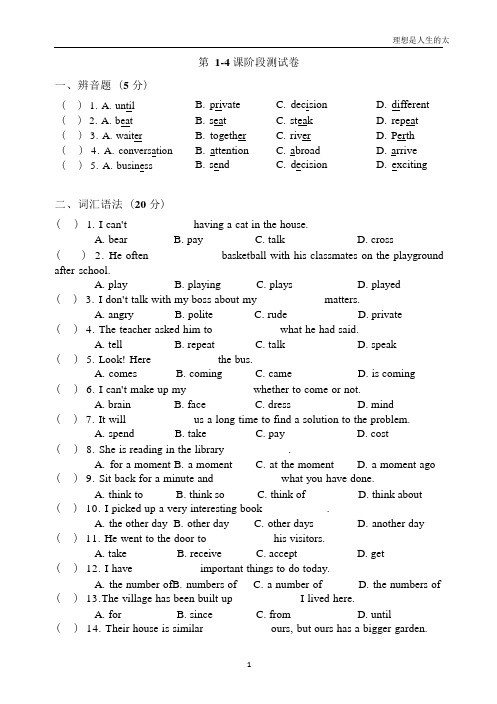
理想是人生的太阳第1-4课阶段测试卷一、辨音题 (5分)( ) 1. A. until B. private C. decision D. different ( ) 2. A. beat B. seat C. steak D. repeat( ) 3. A. waiter B. together C. river D. Perth( ) 4. A. conversation B. attention C. abroad D. arrive( ) 5. A. business B. send C. decision D. exciting二、词汇语法 (20分)( ) 1. I can't __________ having a cat in the house.A. bearB. payC. talkD. cross( ) 2. He often __________ basketball with his classmates on the playground after school.A. playB. playingC. playsD. played( ) 3. I don't talk with my boss about my __________ matters.A. angryB. politeC. rudeD. private( ) 4. The teacher asked him to __________ what he had said.A. tellB. repeatC. talkD. speak( ) 5. Look! Here __________ the bus.A. comesB. comingC. cameD. is coming( ) 6. I can't make up my __________ whether to come or not.A. brainB. faceC. dressD. mind( ) 7. It will __________ us a long time to find a solution to the problem.A. spendB. takeC. payD. cost( ) 8. She is reading in the library __________.A. for a momentB. a momentC. at the momentD. a moment ago ( ) 9. Sit back for a minute and __________ what you have done.A. think toB. think soC. think ofD. think about( ) 10. I picked up a very interesting book __________.A. the other dayB. other dayC. other daysD. another day( ) 11. He went to the door to __________ his visitors.A. takeB. receiveC. acceptD. get( ) 12. I have __________ important things to do today.A. the number ofB. numbers ofC. a number ofD. the numbers of ( ) 13.The village has been built up __________ I lived here.A. forB. sinceC. fromD. until( ) 14. Their house is similar __________ ours, but ours has a bigger garden.A. onB. inC. overD. to( ) 15. He __________ a drink in the bar just now.A. hadB. is havingC. hasD. has had( ) 16. __________ fool I was to believe he is a good man.A. HowB. WhenC. What aD. What( ) 17. Can you show me __________ you have in your hand?A. thatB. whatC. whenD. where( ) 18.Once I __________ decision, there will be no going back.A. makeB. had madeC. am makingD. make a( ) 19. If he __________ here, I will ask him some questions.A. comesB. cameC. comingD. has come( ) 20. My parents __________ Hangzhou for holiday. Please call them later.A. have goneB. have beenC. have been toD. have gone to三、句子填空 (10分)1. You are talking so __________ (loud) that I have to speak at the top of my voice.2. The basketball game was very __________ (excite).3. My father __________ (buy) a present for my mother last week.4. Look! Some boys __________ (play) football in the park.5. She __________ in London for ten years.6. He __________ (read) books in the library every Saturday.7. Can you lend me your car tomorrow? (同义句转换)Can you __________your car __________me tomorrow?8. He is reading a newspaper in the garden. (对划线部分提问)__________is he __________in the garden?四、英汉互译 (15分)1. Mr Smith lives in a small town in the centre of the country.___________________________________________________________________ 2. She went to that public park near her house three days ago.___________________________________________________________________ 3. 她听到这个消息非常惊讶。
- 1、下载文档前请自行甄别文档内容的完整性,平台不提供额外的编辑、内容补充、找答案等附加服务。
- 2、"仅部分预览"的文档,不可在线预览部分如存在完整性等问题,可反馈申请退款(可完整预览的文档不适用该条件!)。
- 3、如文档侵犯您的权益,请联系客服反馈,我们会尽快为您处理(人工客服工作时间:9:00-18:30)。
新概念英语第二册第25-34课测试卷一、单词与短语互译(30分)1.not only…but…as well2.neither…nor..3.外国人4.鉴赏5.材料6.上下颠倒地7.put up one’s tent 8.wind one’s way across… 9.舒适的,安逸的10.爬到…里面 11.believe in ancient myths 12.没有效果13.从某地飞往某地14.废弃(v)15.偏僻的,人迹罕至的 16.row on the river 17. be out of sight 18.对某人大声喊 19.a book of hisown20.他早年的艰难岁月 21.一个穿着讲究的女人22.最昂贵的物品之一 23.出发,动身24.struggle up the cliffs 25.向岸边游去26.在前面(adv.) 27.不知不觉地发现某人处在…28.拜访某地 29.not any more 30.一个十五岁的男孩二、用所给动词的正确形式填空(20分)1.The sun (rise) in the east and (set) in the west .2.”You (joke),”I replied. “I (not know) anyone who does .”3. She (pay) the bill and (leave) the shop.4.”Up till now I (be) to New York three times .” he (add)5.She never expected her bicycle (find). The thief (question).6.On (arrive) at the shore, the girl struggled up the cliff towards the lightshe (see).7.He (worry) all week. Last Saturday he (receive) a letterfrom the local police .8.”You (always be) late , Tom .”his teacher (say). “You(be)late five times this week. You (be) nearly late every class . Don’t (be) late next time. Or I’ll punish you. Then I (call) up your mother.”三、句子翻译(15分)1.她的英文讲得不但非常认真,而且吐字也非常清楚。
(not only …but …as well)2.他们中还没有一个变成石头呢!(none of them)3.那个把飞机降落在田里的飞行员没有受伤。
(whose, hurt)4.和往常一样有去和河边坐着。
(as usual )5.在我二十几岁的时候,我常在一家小商店干活。
(in one’s +整数,used to do )6.人们不再像以前那样诚实了。
(not so …as…)四、单项填空(30分)1.You cannot fail to obey it. You can’t ________to do this.a. refuseb. denyc. resistd. withdraw2.If she _________she will get a surprise.a. comesb. camec. has comed. will come3.They will travel faster. They will travel __________.a. soonerb. more quickly c .hurriedly d. shorter4.She never thought ___________it again.a. forb. toc. atd. about5.I have been offered a large ____________of money.a. amountb. numberc. somed. piece6.I looked for my bag. I __________it.a. tried to look afterb. tried to look atc. tried to findd. tried to see7.The money____ in his room.a. wasb. werec. ared. has8.He could do nothing. He couldn’t do_________.a. somethingb. nothingc. anythingd. everythin g9.It began to rain so we called the match .a. outb.upc. offd.at10.He told me about his experiences.a. passedb.pastc.futured.ahead11.A detective recently watched a well-dressed woman. He her.a.lookedb. looked forc. looked afterd. looked at12.The assistant wrapped the dress up him as as she could .a.for…quickb. to…quickc. for… quicklyd. to…quickly13.I’ve just found a new and begin on Monday .a. work… jobb. a job… workc.job…a workd. job…work14.The ploughed field is ready for .a.growingb. seedingc.sowingd.sewing15.He the book with him when he came to see me .a.fetchedb.tookc. bringd. brought五、完型填空(20分)Life used to be fun for the teenagers. They 1 to have more money to spend, and free timeto spend in it. They used to 2 teenagers clothes, and 3 in teenager coffee bars. Some of them still 4 today. 5 , for many young people, life is 6 now. Things are more 7 . Jobs are difficultto find, and it is harder to find a place to live 8 . Some teachers say that students study harder than 9 used to. They are only interested in passing examinations. They know that 10 examination result may get them better jobs.For some, the 11 to unemployment is to leave home and lookfor work in big cities. Every day hundreds of 12 people 13 in Beijing, Shanghai and other big cities. Some of them find work, an d 14 . Others don’t find it, and go 15 again.Everyday when you 16 the newspaper, you can find the news about people’s unemployment. Actually, China’s government has taken 17 to help the young people. It supplies many new 18to them. We believe in the 19 the situation will be 201. A liked B like C used D use2. A dress B wear C buy D have3. A eat B play C meet D chat4. A can B have C are D do5. A Therefore B However C But D Then6. A better B enjoyable C difficult D harder7. A expensive B cheap C different D delicious8. A in B at C for D on9. A we B you C they D he10. A better B good C well D best11. A problem B question C answer D way12. A bad B old C good D young13. A arrive B reach C go D come14. A leave B stay C go D come15. A there B in C to D home16. A read B look C watch D see17. A off B out C actions D on18. A space B opportunities C money D resources19. A century B year C month D future20. A better B worse C good D bad六、阅读理解(20分)(A)Most people who work in the offices have a boss, So do I. But my boss is a little unusual . What’s usually about him? It’s a big dog. Many men have dogs, but few men bring their dogs to the office every day. My boss’s dog, Robinson, is big and brown. My boss brings him to work every day. He takes the dog to meetings and he takes the dog to lunch. When there is a telephone call for my boss, I always known if he is in the office. I only look under his desk. If I see something brown and hairy under it, I know my boss is somewhere in the office. If there is no dog, I know my boss is out.( ) 1. People ______ bring dogs to the office.A. usuallyB. oftenC. seldomD. sometimes( ) 2. My boss is Robinson’s _______ .A. bossB. masterC. keeperD. teacher( ) 3.Robinson goes to meetings ________ my boss.A. forB. withoutC. instead ofD. with( )4. Robinson is always under the desk if the boss is ____.A. in the officeB. at the meetingsC. out of the officeD. out of the work( ) 5.The passage tells us the boss ___ the dog very much.A. looks likeB. hatesC. likesD. looks down upon(B)Wang Fei can speak English quite well because she works very hard at it.One day, her teacher, Mr. Wu asked her to come to his office and side, : There will be a story-telling contest(竞赛) next week, Wang Fei. Would you like to take part in it?”Wang Fei wanted to go, so she asked what she had to do. Mr. Wu told her that she had to tell an English story in front of the whole school. Mr. Wu said:” If you try your best, I’m sure you’ll win.”Wang Fei decided to have a try.On Sunday night, she stayed up late to get ready for her story for the contest. It was interesting story, she didn’t go to bed until midnight. On Monday morning, she overslept(睡过头 ) . When she woke up, it was alread y seven 0’ clock. She did some washing quickly. Then she had a light breakfast. After that she ran all the way to her school.It was a warm morning, so Wang Fei felt very hot when she reached school. Mr. Wu was waiting outside the school hall, he looked very worried.“ Why are you so late, Wang Fei?” he asked.“ Sorry, Mr. Wu, I woke up late.” Wang Fei said.“ The contest will start in a minute. Remember, speak slowly and clearly.” Mr. Wu said. Wang Fei remembered his words. She told her story very well. In the end, she came out first. “You have done very well. Congratulations!” said the teacher. “All is well that ends well. But remember, don’t oversleep again!”( )1. Wang Fei works hard at ________.A. contestB. ChineseC. EnglishD. his lessons( )2. Wang Fei will be in ______ next week.A. a story-telling contestB. a sports meetingC. an English partD. a school meeting( )3. On Sunday night, Wang Fei went to bed_______.A. late as usualB. early as usualC. later than beforeD. earlier than before.( )4. At last, Wang Fei _______.A. was nearly firstB. came lastC. was not secondD. got first.( )5. Choose the best title for the passage, __________.A. Who was firstB. All’s well that ends wellC. Wang Fei Learns English bestD. An English contest七、作文(15分)暑期将过,请用英文以“The Happiest Day”为题,记下你度过的最快乐的一天,100字左右。
